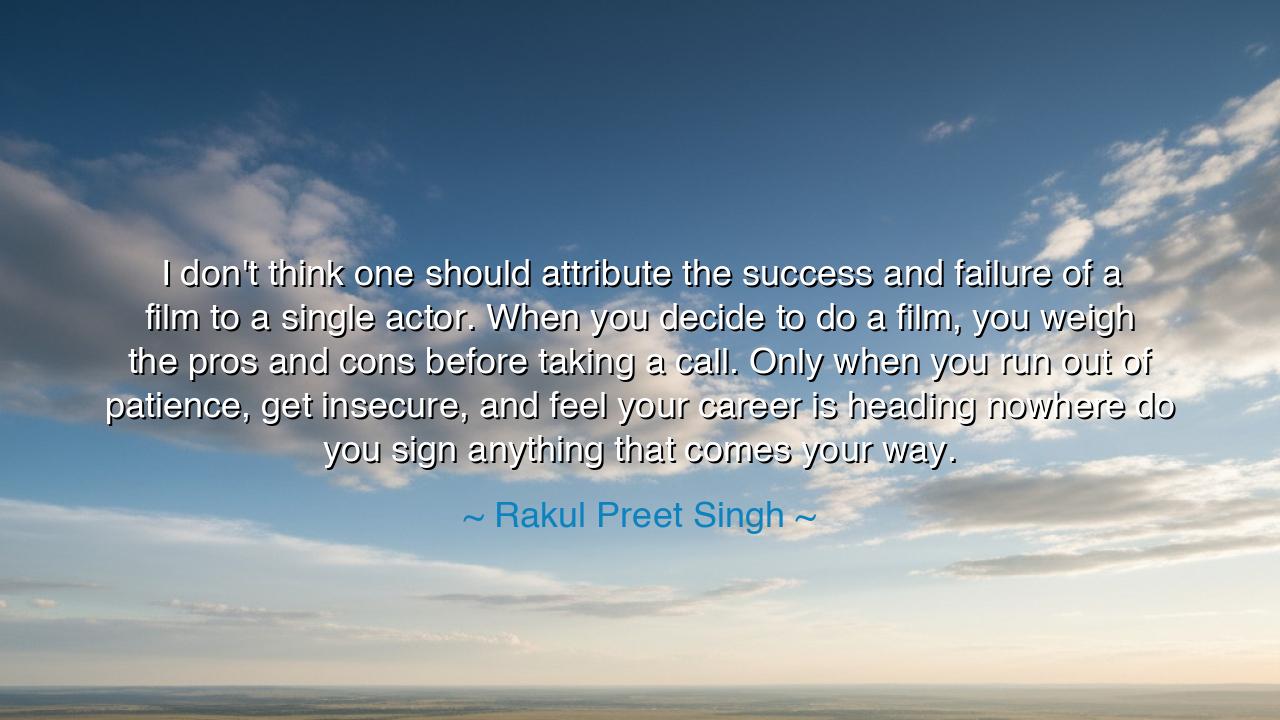
I don't think one should attribute the success and failure of a
I don't think one should attribute the success and failure of a film to a single actor. When you decide to do a film, you weigh the pros and cons before taking a call. Only when you run out of patience, get insecure, and feel your career is heading nowhere do you sign anything that comes your way.






Rakul Preet Singh once declared with wisdom born of experience: “I don't think one should attribute the success and failure of a film to a single actor. When you decide to do a film, you weigh the pros and cons before taking a call. Only when you run out of patience, get insecure, and feel your career is heading nowhere do you sign anything that comes your way.” In these words, she strikes at the heart of two great truths: the collective nature of art and the danger of impatience. She reminds us that success is never the work of one alone, and that desperation often leads to choices that weaken both spirit and legacy.
The origin of this reflection lies in her journey as an actress navigating the shifting tides of cinema. She has witnessed how audiences and critics often elevate or condemn a film based on the performance of a single star, forgetting that cinema is a tapestry woven of many hands: the director’s vision, the writer’s craft, the technicians’ skill, and the actor’s embodiment of character. To burden one actor with all the weight of success or failure is to misunderstand the communal nature of storytelling. Her words remind us that true art is born of collaboration, not individual glory.
History has shown this truth time and again. Consider the great Greek tragedies, performed in amphitheaters before thousands. Though the actors held the stage, it was the chorus, the playwright, the musicians, and even the architecture itself that gave the performance its power. If the audience wept at Oedipus Rex, it was not because of one actor alone, but because of the union of many elements. Likewise, when a film triumphs, it is the harmony of all its parts; and when it falters, it is rarely the fault of one soul.
Yet Rakul’s words carry a second warning, one directed at the heart of the individual artist: the danger of insecurity. When fear whispers that one’s career is faltering, and when patience gives way to desperation, there arises the temptation to seize any opportunity, regardless of its worth. This impulse, though human, often leads to regret. For in the haste to keep moving, one may abandon discernment, losing sight of the very standards that give life meaning. Thus she teaches that patience is not passivity, but strength—the strength to wait for the role, the opportunity, the calling that is truly aligned with one’s path.
This is not only the lesson of cinema, but of all life. In business, in relationships, in personal growth, rushing into unworthy choices from fear of standing still leads to entanglement in burdens difficult to escape. But those who cultivate patience, who choose carefully, who weigh pros and cons before committing, build a legacy that endures. For life, like film, is not measured by how many projects we take on, but by the depth and integrity with which we live them.
Consider the example of Leonardo da Vinci, who often labored slowly, sometimes to the frustration of his patrons. Yet his patience gave the world works like The Last Supper and Mona Lisa, creations that have outlived centuries. Had he rushed into projects unworthy of his genius, his name might have been lost in time. Rakul’s words mirror this ancient wisdom: haste may fill the present, but only patience secures the eternal.
The lesson for us all is clear: do not allow fear or insecurity to dictate your path. Honor the collective nature of success, remembering always that no achievement is yours alone, but the fruit of many hands and hearts. At the same time, guard your choices with patience. Do not grasp at every passing chance, but discern what aligns with your true purpose. In this way, your life, like a well-crafted film, will stand not as a collection of hurried scenes, but as a story worthy of remembrance.
So let Rakul Preet Singh’s words echo as timeless counsel: patience and respect for collaboration are the pillars of lasting success. Remember them, O seekers of greatness, and you will not only endure but create works, choices, and legacies that shine far beyond the fleeting applause of the moment.






AAdministratorAdministrator
Welcome, honored guests. Please leave a comment, we will respond soon